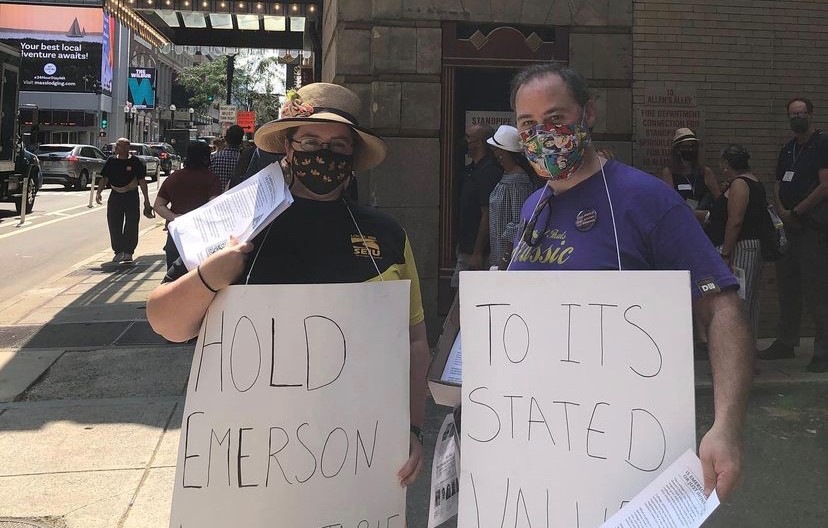Hold Emerson Accountable to its Stated Values
A few weeks ago, some of our union members handed out flyers questioning what appear to be union-busting tactics on the part of the administration and urging them to bargain with us in good faith as we enter negotiations this fall. During this leafleting, some of our members wore signs that read “Hold Emerson Accountable to its Stated Values.”

What do we mean when we say that we want to hold the college to its stated values? The long-term trend toward increasing executive compensation, as well as recent decisions by the college not to pay union staff our contractual raises (offering smaller lump-sum payments instead) and not to hire more staff even though our student body is increasing, have been troubling. Between 2018 and 2020, Emerson’s student population grew by almost 13%, but the number of staff actually decreased by 2% in the same period.
Emerson’s Five Pillars
Since 2011, the College’s strategic plan has been based upon the following five pillars: Academic Excellence, Civic Engagement, Internationalization, and Global Engagement, Innovation, and Financial Strength. By remaining understaffed, and shortchanging the staff who are here, we believe Emerson is unable to uphold the pillars necessary to achieve its strategic objectives and stated values.
Academic Excellence
With high staff turnover, Emerson can’t support its faculty. When faculty incur delays in IT response time due to staff shortages, it affects their classes and the students in them. How can we deliver academic excellence, when we have to tell faculty they have to wait for IT to install new licenses for their research software that expired in August because we are down to two staff members for the entire Help Desk?
Civic Engagement
Many civic engagement programs at Emerson, such as a summer film program for low-income Massachusetts high school students, are run by individual faculty, dependent on external funding, and have no overarching institutional or staff support. Important programs such as these run for a few years and then die off, only to be started up again by someone else if they can get funding, leaving no continuity within the community.
Internationalization and Global Engagement
Our staffing is too low to fully meet the needs of international students. Last year, during the pandemic, international students told the Berkeley Beacon that they were disappointed with the lack of details in Emerson’s plan for international students and the length of time it took the college to communicate with them. Students tried to get information from their faculty advisors because low staffing and turnover in the office of international student affairs delayed communications to students. How can Emerson possibly be a “global hub” for communication and the arts when its international student affairs office was run by 2 (now 3) staff members?
Innovation
When the same programs are created, and then abandoned with staff turnover, only to be recreated again, the focus is on the bare bones, not innovation. Studies have shown that when people lack resources to get their work done or when they struggle to pay their bills, they can’t participate fully in innovation. When employees struggle with the cost of living, regardless of industry or geography, they are significantly less likely to experience innovation. These concerns get compounded when they see their organization, or people at higher levels, thriving financially.
Financial Strength
While maintaining a lean staff might appear to save the college money, or at least save more money for increased upper administration salaries (five Emerson vice presidents earned over $300,000 last year) there are costs, both financial and non-financial, associated with high turnover. Every time the college replaces a salaried employee, it costs six to nine months’ salary, on average, in recruiting and training expenses (although Emerson is known to cut corners on training, too). In addition, lean staffing damages the college’s reputation, and in turn its ability to grow.
Accountability
A recent press release published by PR Web summarizes the problem perfectly:
“Inadequate staffing is a principal contributor to job-related stress, which is, in turn, a principal factor in turnover. Employees in understaffed organizations can lack a sense of control over their rapidly increasing workload. This hectic environment can lead to poor work performance and can be detrimental to the organization as a whole.”
We’d like to hold Emerson accountable for its stated values, vision, and strategic plan. Staff want to help. But when we are asked to complete all of our original job responsibilities along with those of our peers who have left for better employment, we feel the need to call out this hypocrisy.
